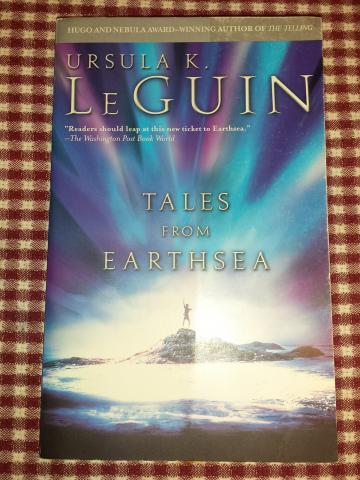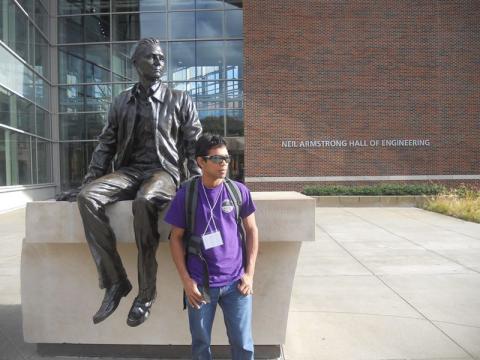Book Review: Ursula K. LeGuin's "Tales From Earthsea"
Dec 11,2015
As a genre, fantasy has long gotten the short end of the stick. Although there were some classics respected by mainstream readers like C.S. Lewis' Chronicles of Narnia and J.R.R. Tolkien's The Hobbit and Lord of the Rings trilogy, the vast majority of it was generally dismissed as esoteric, escapist drivel for nerds and man-children with poor social skills. But in recent years, the genre has enjoyed a level of respect and even popularity, with the success of such multi-volume series' as Rick Riordan's Percy Jackson & the Olympians, Stephanie Meyers' Twilight, and, most notably, J.K. Rowling's critically acclaimed and enormously profitable Harry Potter series indicating the high interest in fantasy stories. Responsibility for this monumental shift in reception of fantasy works can in no small part be placed in the well-exercised hands of Ursula K. LeGuin. A writer of both fantasy and science fiction, LeGuin has produced story upon story for half a century now, writing well after many others would retire their quill to the inkpot long before. Not only has she written consistently, she has also managed to inject an unprecedented level of sophistication and nuance into the genre over the course of her extensive career. She may write about the world of Earthsea and other exotic locales in her books, but the stories are just as much about our world as they are the world of her characters. This couldn't be more apparent in Tales From Earthsea, one of the more recent entries in her groundbreaking, decade-long Earthsea series.
The first selection in the book, a briskly-paced novella simply titled "The Finder", perfectly exemplifies the relevant-to-the-real-world sort of world-building that LeGuin is known for. Readers are introduced to Havnor Great Port, "the city at the heart of the world," (LeGuin, pg. 3), where pirates run rampant, magic is suppressed, and the people at large are oppressed. It is in these inhospitable conditions that Otter, an ordinary boatwright's son, is born. Or at least, he would be ordinary, if it weren't for a very special gift he was born with: the ability to conjure and manipulate the magic that was so feared by the denizens of Havnor. Despite the best efforts of his parents (and by "best efforts", I mean beatings from his father), the boy's gift refused to go away, leading to his mother finally accepting his abilities and confiding to him, "It's as if you'd found some great jewel... and what's one of us to do with a diamond but hide it? Anybody rich enough to buy it from you is strong enough to kill you for it. Keep it hid." (LeGuin, pg. 7) And hide it he does, until the forces of Gelluk, their interest piqued by the boy's underhanded sabotage of a pirate vessel, come calling. Taken into captivity, Otter is forced to use his magic to help the powerful wizard find a great lode of ore deep underground, with which he will create weapons of war to conquer Earthsea. Cursing the Earth itself, he declares, "She holds him back and hides him deep, fearing to give birth to her master. That is why, to give him birth, she must be burned alive." (LeGuin, pg. 35). It is only through the intervention of the mysterious, doomed Anieb that Otter is able to escape Gelluk's clutches and flee to fight another day. This is only the beginning of the story, but as one can gleam from this synopsis, "The Finder" is a captivating tale of the powerful versus the powerless, of warmakers versus peacemakers, that is strikingly pertinent to modern times.
The short stories also collected in this volume similarly touch upon weighty topics. "Darkrose and Diamond", for instance, deals with forbidden love and prejudice by way of the romance between the eponymous magically-skilled and musically-inclined couple. Diamond's father Golden disapproves of the relationship owing to Darkrose's mother's background as a witch (witches are not respectable people, you see?) and sends him to Roke, the island where Otter established a training school for "crafty people" (Earthsea vernacular for the magically gifted) in the previous entry, to study under the dour Hemlock. In spite of the clear shot he has at becoming a powerful wizard, Diamond leaves Roke and admitting he has "betrayed everything. The magic. And the music. And you," (LeGuin, pg. 146) joins Darkrose on the road as a traveling musician, leaving their troublesome magic and disapproving families behind. The last tale, "Dragonfly", has a pronounced feminist streak to it, as the titular Dragonfly has obstacle after obstacle thrown her way as she seeks an education at Roke. Intended strictly for wizards, the school makes no room for witches and other female practitioners of magic. "The Rule of Roke forbids women to be taught any high art, any word of the Language of the Making. It's always been so. They will not listen," (LeGuin, pg. 238) the Doorkeeper to the school explains to her upon her arrival. But all is not lost. The Doorkeeper quickly adds, "So they must be shown!" (LeGuin, pg. 238) And show them she does when at the end she reveals her true form: a giant, golden dragon, long thought to be extinct in Earthsea. She flies away as the wizards who doubted her earlier watch stunned, with the Doorkeeper thoughtfully concluding, "I think we should go to our house, and open it's doors." (LeGuin pg. 279)
It is this marriage of social critique and fantastic imagery that makes LeGuin's work so effective. While similar messages in more realistic genres of fiction might have come across as heavy-handed and didactic, the enchanted setting provides enough distance between the material and reality for readers to be more appreciative of the ideas being communicated than they likely would be in a book set in a conventional environment. Not to imply that LeGuin is some moralistic Aesop of fantasy literature: au contraire, she conveys her beliefs and positions in her stories without ever hitting readers' over the head with them. There is no question where she stands on, say, gender equality, but her stance is never the centerpiece of any given tale. No, the centerpiece of each tale, if not the book itself, would be the world of Earthsea itself, filled to the brim with conniving wizards, benign witches, and most importantly, brave heroes from humble backgrounds who overcome their fears and failings to save the day, whether it be Otter outsmarting not one but two power-hungry wizards to liberate Havnor in "The Finder" or the elderly mage Dulse sacrificing himself to save Gont Port in "The Bones of the Earth". The ideas inform it, but the magic of both the world and the way it is told are what make Ursula K. LeGuin's Tales From Earthsea a worthwhile read.






